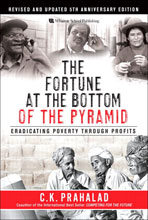
Five years ago, C.K. Prahalad published a book titled, The Fortune at the Bottom of the Pyramid, in which he argues that multinational companies not only can make money selling to the world's poorest, but also that undertaking such efforts is necessary as a way to close the growing gap between rich and poor countries. Key to his argument for targeting the world's poorest is the sheer size of that marke.
Knowledge@Wharton: In the five years since The Fortune at the Bottom of the Pyramid was published, what impact have your ideas had on companies and on poor consumers?
C.K. Prahalad: The impact has been interesting and profound in many ways — much more than one could have expected. For example, several of the multi-lateral institutions — The World Bank, UNDF [United Nations Development Fund], IFC [International Finance Corporation] and USAid — have fundamentally accepted the idea that involvement of the private sector is critical for development…. I asked 10 CEOs of companies as diverse as Microsoft, ING, DSM, GSK and Thomson Reuters to essentially reflect on whether the book has had some impact on the way they think about the opportunities. Uniformly, everybody — whether it is Microsoft or GSK — essentially says not only that it has had some impact, but that it has changed the way they approach innovation and … new markets.

